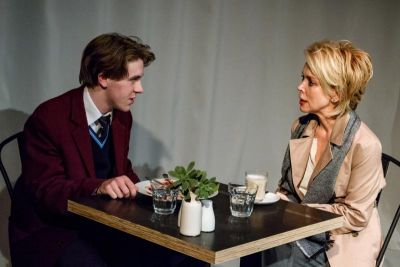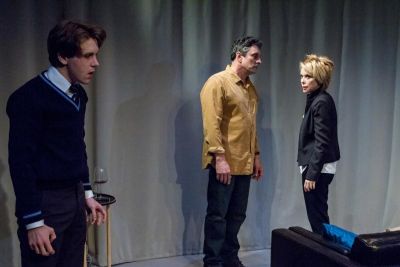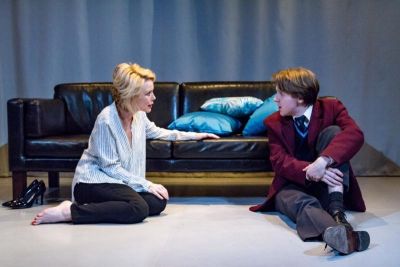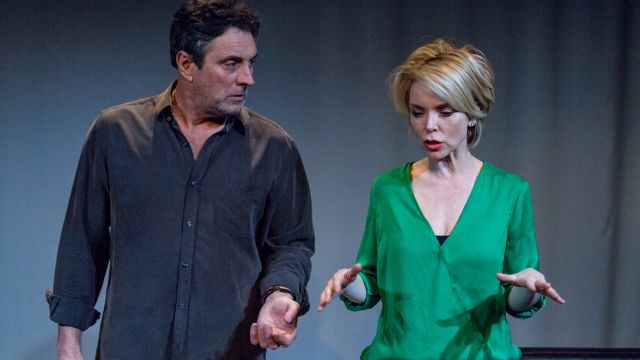Fury
Two private school boys, Joe (Sean Rees-Wemyss) and his mate Ethan (whom we never see), deface and vandalise a mosque. Joe’s happy but complacent parents, medical research scientist Alice (Danielle Carter) and stalled novelist Patrick (Joe Petruzzi) are horrified – but more by the completely unexpected vandalism and graffiti than by the beliefs behind them. At least it seems that way since this shaming disruption comes at a bad time: Alice is about to receive an award for her research, the result of years of work and struggle and Joe’s actions won’t reflect well on her. Patrick is shocked at this – but Alice is a realist with iron in her soul.
Alice and Patrick deny Joe’s vehement anti-Muslim explanation – which is pretty much straight from the One Nation songbook – and try to rationalise their son’s action, including by convincing themselves that Joe was ‘led on’ by Ethan – a belief strengthened by Ethan’s parents, redundant car worker now trying to get into construction Bob (Chris Connelly) and ex-hairdresser Annie (Shayne Francis). They don’t like Muslims or the mosque much either, but ‘you know, it’s a free country...’ Ethan is only at the expensive school because of a sports scholarship, which he will now lose. Bob and Annie insist it was Joe led Ethan on – and worse, that Joe planned to burn the mosque down!
 Meanwhile, at the school, Vice Principal Warren (Dushan Phillips), although suitably unctuous with Alice and Patrick, is cynically honest with Joe. (It’s a nice touch that the Principal is conveniently never available.) Warren doesn’t care about Joe’s actions per se or the reasons for them; he only cares about the school’s reputation and his job. But Joanna Murray-Smith decided – or was convinced – that the play didn’t need Ethan, although the consequences for him are much harder than for rich boy Joe. (No Ethan is indicative of the play’s real priorities.) Luckily, however, the local Iman does not want to press charges. Joe gets only a two-week suspension and is to write a carefully worded apology to the Iman and the Muslim community. He is humiliated as his political act (as he sees it) and his anti-Islamist convictions – in which he believes with all the hot certainty of youth – are minimised and passed over. This may be precisely one of the points Ms Murray-Smith wishes to make: that the real substantial issues are evaded or lost in the shuffle of shock, blaming, guilt and either knee-jerk racism or knee-jerk ‘liberal’ tolerance.
Meanwhile, at the school, Vice Principal Warren (Dushan Phillips), although suitably unctuous with Alice and Patrick, is cynically honest with Joe. (It’s a nice touch that the Principal is conveniently never available.) Warren doesn’t care about Joe’s actions per se or the reasons for them; he only cares about the school’s reputation and his job. But Joanna Murray-Smith decided – or was convinced – that the play didn’t need Ethan, although the consequences for him are much harder than for rich boy Joe. (No Ethan is indicative of the play’s real priorities.) Luckily, however, the local Iman does not want to press charges. Joe gets only a two-week suspension and is to write a carefully worded apology to the Iman and the Muslim community. He is humiliated as his political act (as he sees it) and his anti-Islamist convictions – in which he believes with all the hot certainty of youth – are minimised and passed over. This may be precisely one of the points Ms Murray-Smith wishes to make: that the real substantial issues are evaded or lost in the shuffle of shock, blaming, guilt and either knee-jerk racism or knee-jerk ‘liberal’ tolerance.
But if that is a point she wishes to make, it is made in passing, because Fury moves on, as it were, into what appears to interest Ms Murray-Smith more: the exploration of her more familiar territory of class differences and the shaky foundations of a marriage. The attack on the mosque becomes not much more than a catalyst for exposing the evasion of the issue, the supressed conflicts and resentments between social classes and within an ostensibly ‘happy’ marriage.

It isn’t that that the boys’ action would not believably be such a catalyst, but one is left with the feeling that a major issue of our time is (like Ethan) left rather unexamined, that it is merely used, so to speak. We never find out the source of Joe’s beliefs, or even what he sprayed on the mosque. As the play proceeds – in what comes to seem a rather one-note mode – two if the most powerful scenes are those in which the strong, ambitious Alice totally demolishes Patrick, and another where Alice fumbles to make amends to Ethan, Annie and Bob – and is soundly dismissed.
My reservations are, I believe, due the text, but the Red Stitch cast, as usual, works with might and main to make it play – and, within what one takes to be the playwright’s intentions, they do. Ms Carter as Alice, however, opts for a lot of angry shouting, which becomes rather monotonous, wearing and grating – but perhaps she and the two directors, Ella Caldwell and Brett Cousins, decided that was the way to realise the character. But Sean Rees-Wemyss does a fine job in conveying Joe’s dogmatic certainties and his youthful dismay at not – not really – being taken seriously. Joe Petruzzi’s Patrick is a very accurate, modulated portrait of an ebullient fellow exposed by crisis as fumbling and weak. Dushan Phillips is a cunning bit of casting – the outsider among these Anglos and therefore all the more clear about his priorities, but also modulating nicely between ‘respectful’ and icy realist. Chris Connelly does his blinkered salt of the earth persona – because that’s what’s required – and does it well - and leaves the dignified but real and beautifully understated punch to Shayne Francis. Annie’s final line to Alice may be – on reflection – phoney, but in the moment, it is devastating.
 The problems of the piece are not helped by a decision to mask scene changes by drawing a full-length but slightly translucent curtain across the entire stage – something which irritates and emphasises rather than facilitates the one-punch-two-punch rhythm. Kris Chainey’s lighting is functional but appropriate to scenes which, with three exceptions, are all set in ‘normal’ interiors. More might have been done with the two front door steps scenes, which surely imply a barrier that won’t ever again be crossed. Sound design by THE SWEATS is mostly supportive but at times ventures into inappropriate melodrama.
The problems of the piece are not helped by a decision to mask scene changes by drawing a full-length but slightly translucent curtain across the entire stage – something which irritates and emphasises rather than facilitates the one-punch-two-punch rhythm. Kris Chainey’s lighting is functional but appropriate to scenes which, with three exceptions, are all set in ‘normal’ interiors. More might have been done with the two front door steps scenes, which surely imply a barrier that won’t ever again be crossed. Sound design by THE SWEATS is mostly supportive but at times ventures into inappropriate melodrama.
In all – and despite some genuinely excoriating scenes of domestic battle – Fury disappoints by veering off from its set-up to areas into which Ms Murray-Smith has ventured before – and very well too – but here ventures at a rather relentless pitch that wrings us out in a way that seems in the end beside the point – the point at which we begin.
Michael Brindley
Photographer: Teresa Noble.
Subscribe to our E-Newsletter, buy our latest print edition or find a Performing Arts book at Book Nook.

